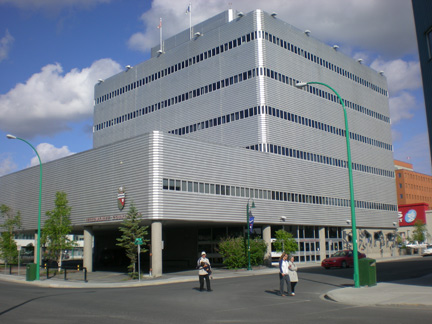
Yellowknife lawyers say the impending closure of the city’s law library could have significant impacts on access to justice in the Northwest Territories.
 There is already a struggle to find lawyers that suit a clients needs in the small rural jurisdiction and taking away the library could exacerbate the problem further, says Caroline Wawzonek, the chairwoman of the criminal law section for the Canadian Bar Association’s N.W.T. branch.
There is already a struggle to find lawyers that suit a clients needs in the small rural jurisdiction and taking away the library could exacerbate the problem further, says Caroline Wawzonek, the chairwoman of the criminal law section for the Canadian Bar Association’s N.W.T. branch.
“Costs are already quite significant in the north and access to lawyers is quite a challenge. People are already having difficulties finding lawyers in a lot of areas of practice,” she says. “This will not make that easier.”
Wawzonek says the closure would likely result in an increase in cost for clients, as lawyers will have to spend more on resources.
Bar members were first alerted to the fact the N.W.T Department of Justice had decided to close the library in an e-mail from the law society.
“I think [I was] shocked and disappointed no one was consulted. Members of the bar were not consulted because I would usually notice and participate in that kind of thing,” says Sandra MacKenzie, a litigation lawyer with Lawson Lundell LLP, who is fighting the closure.
“What’s going to happen to the collection? Where any alternatives considered and where are self-represented litigants going to go?”
The justice departmetn said the decision was made because costs have increased over the years while usage has steadily decreased. Last year, it cost the government $467,000 to run the facility, which only saw 984 visits and only had 385 books signed out, according to the government.
“That breaks down to a cost of almost $500 each time a user stepped in the door, and over $1,200 for every book checked out,” justice spokeswoman Marie-Eve Duperre told Legal Feeds in an e-mail.
However, lawyers say the usage numbers the government provided might not be accurate as not everyone signs the attendance book when they enter the library.
While outright closure could save the Department of Justice money, Wawzonek says the N.W.T. CBA branch would like to see an alternative solution achieved through consultations.
“Reduced use and being over budget that to me seems like a financial math problem and not one that is necessarily best solved by a blanket decision to close the law library,” says Wawzonek, who uses the library whenever she has a trial in Yellowknife.
“We’re still hopeful a solution that supports the bar and supports access to justice, while still being fiscally responsible can be found.”
The N.W.T. law society is currently canvassing its members for their opinions and expects most responses will express displeasure, says spokesman Bob Wilson.
“It is unclear whether the results of our informal survey will change any minds, as it appears that the government of the Northwest Territories’ Department of Justice has made its decision,” Wilson said.
Sole practitioners, small firms, and self-represented litigants are likely to be most affected, as they do not have the resources of a large firm, says MacKenzie. But ultimately any lawyers who use the library will be affected.
“We’re a small rural jurisdiction. So lawyers are already struggling to have access to the most timely and most thorough, up to date materials,” says Wawzonek.
“It’s more challenging. People are often sole practitioners or in small groups of practitioners. They’re not necessarily in the position to each individually be buying every tome that’s come out in a certain area of practice.”
The government says court services will offer an interlibrary service, allowing people to access books in Alberta law libraries, but Wawzonek worries whether such a system will be an acceptable resource for lawyers in Yellowknife.
“It does not meet the need for lawyers who need information quickly, immediately, whether it’s a quick reference on a trial mater they’re in the middle of or whether it’s something they’re working on that they need to do some in depth research on,” she says.
“This is the only resource for many lawyers in the territory.”
While bar members are hoping there might be some chance of reversing the decision, they may be too late as the N.W.T. legislature is set to vote on its budget in the next couple of weeks.